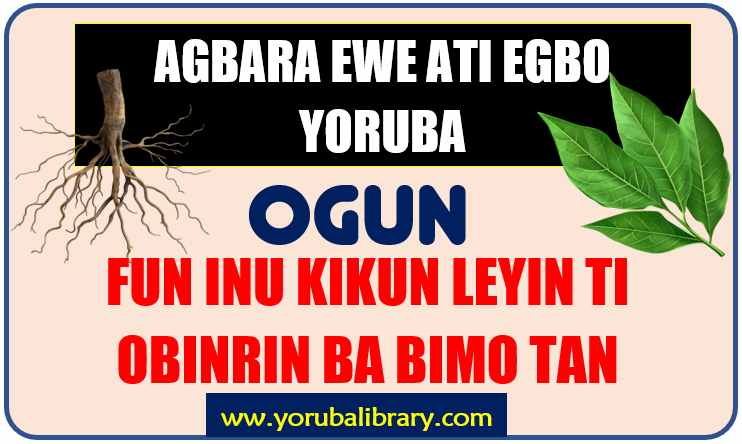
support@yorubalibrary.com
+2348073529208, 07038599574

Among the Yoruba, childbirth is a wonderful moment to be celebrated, but the period immediately after delivery is considered equally critical. New mothers are recognized as vulnerable, not just physically, but also emotionally. One common issue observed by Yoruba elders is Inu Kikun Leyin Ti Obinrin Ba Bímọ — a condition where women experience irregular bowel movements, stomach discomfort, rumbling sounds, or eruptions soon after childbirth. Our forefathers developed remedies to restore balance to the digestive system, alleviate discomfort, and support the mother’s recovery. These remedies were not merely medicinal but combined physical, and dietary care to ensure smooth postpartum healing.
Our forefathers developed remedies to restore balance to the digestive system, alleviate discomfort, and support the mother’s recovery. These remedies were not merely medicinal but combined physical, and dietary care to ensure smooth postpartum healing.
By addressing digestive disturbances early, Yoruba women regained strength, confidence, and vitality, ensuring they could care for their newborns without prolonged discomfort or illness.
Disclaimer
Yoruba Library and its Team will not be held liable for improper usage or any loss arising from improper use, wrong application, inability to find needed materials, or misinterpretation of this article. This article is provided strictly for guidance and educational purposes.
Symptoms of Postpartum Bowel Issues
In Yoruba tradition, elders and traditional midwives observed signs that indicated the need for Ogun Inu Kikun Leyin Ti Obinrin Ba Bímọ remedies:
• Stomach rumbling or gurgling — Persistent sounds indicating digestive imbalance.
• Abdominal bloating — Swelling or discomfort in the belly.
• Eruption or gas release — Frequent flatulence or sudden bowel movements.
• Diarrhea or irregular stools — Loose stools causing weakness and discomfort.
• Restlessness or irritability — Emotional unease linked to physical discomfort.
• Loss of appetite or nausea — Reduced desire to eat, affecting recovery.
• Weakness or fatigue — Feeling drained despite resting.
Yoruba Elders understood that addressing these signs early with proper remedies helped mothers regain strength, prevented complications, and ensured smooth recovery.
How Our Forefathers Treated Inu Kikun Leyin Ti Obinrin Ba Bímọ
When new mothers showed symptoms, Yoruba healers and midwives applied structured remedies:
1) Herbal decoctions to ease bowel movement and reduce bloating.
2) Gentle steaming or bathing with specific leaves to relax the abdomen.
3) Anointing the stomach and lower back with herbal pastes to relieve discomfort.
4) Dietary guidance to strengthen digestion and prevent recurrence.
Amongst plants, roots and herbs which our forefathers used in formulating Ogun inu kikun leyin ti Obinrin ba bimo tan are:
a) Ewe Oro Abebe
b) Ewe Odundun
c) Ewe rerinkomi
d) Egbo Akoko
e) Ewe Gbegi
f) Kananfuru
g) Eso Koropo
Have you heard of Yoruba Herb Dictionary? This contains names of Yoruba Leaf, Roots, Barks, Characteristics, Properties & Identification with HD Pictures. Order below or download sample here
A-Z HERBS & LEAF DICTIONARY #4KOne Yoruba proverb says "Bí olóde ò kú, òde rè kì í wu Gbégi". Do you know that Gbégi is actually a leaf/plant? Get Yoruba Proverbs on Plants and Herbs, which is a collection of Untold Wisdoms Hidden in Leaf and plants comprising their Life Applications & Moral Teachings. Order below or download sample here
YORUBA PROVERBS ON PLANTS #4KThe Healing Process in Traditional Practice
When preparing remedies for postpartum bowel discomfort, Yoruba elders followed precise steps to ensure effectiveness and safety:
• Collecting herbs, leaves, roots, or barks at times believed to enhance potency.
• Cleaning, pounding, or boiling materials into decoctions, teas, or herbal pastes.
• Administering the first doses carefully while monitoring the mother’s reaction.
• Combining remedies with dietary guidance and gentle postnatal care for optimal results.
Differences Between Yoruba and Modern Digestive Treatment
While both Yoruba traditional medicine and modern approaches aim to restore bowel health, their methods differ:
1) Focus of healing —
Yoruba remedies emphasize restoring digestive energy, spiritual balance, and overall postpartum strength; modern medicine focuses on hydration, electrolytes, or pharmacological intervention.
2) Materials used —
Yoruba healers used herbs, leaves, and roots; modern treatment relies on medications, supplements, or medical procedures.
3) Approach to recurrence —
Yoruba healing included lifestyle adjustments and spiritual cleansing; modern treatment often relies on continuous monitoring and repeated medication.
Safety First: Important Contraindications and Considerations
• Pregnancy and Lactation — Remedies are intended for postpartum use; caution is advised if breastfeeding.
• Underlying conditions — Women with chronic illness (e.g., diabetes, hypertension) must consult both elders and medical professionals.
• Quality of Source — Herbs from polluted areas or chemically treated environments are unsafe and must not be used.
Needed Materials (Leaves, Roots, Bark, etc.)
The medicinal approach for this requires careful selection of natural materials traditionally known to our elders. These are combined to ensure potency.
The instruction you will receive is the original account of our forefathers, preserved and tested over time. Many people have used them with testimonies of relief. Just ensure you follow the correct guidelines. Click Unlock Secret below
Application Process
The strength of Yoruba medicine depends on how materials are handled. Proper pounding, boiling, or steeping — done in the right way and at the right time — ensures the remedy remains potent. Click Unlock Secret below
Uses
The prepared remedy must be applied in the correct manner — whether for drinking, steaming, bathing, or chest rubbing — and taken in the right dosage for it to remain effective.
1) Some leaf required special utterances/chants before they can be effective. Where applicable, this will be stated in the PDF
2) The methods of getting the needed items like leaf, bark, roots by yourself is covered in the PDF
3) Saa bi Ologun ti wi, ki o le baa je... (Follow instructions for it to remain potent). You're getting a Real and Original account of our fore fathers.
With Numerous Satisfied Clients...